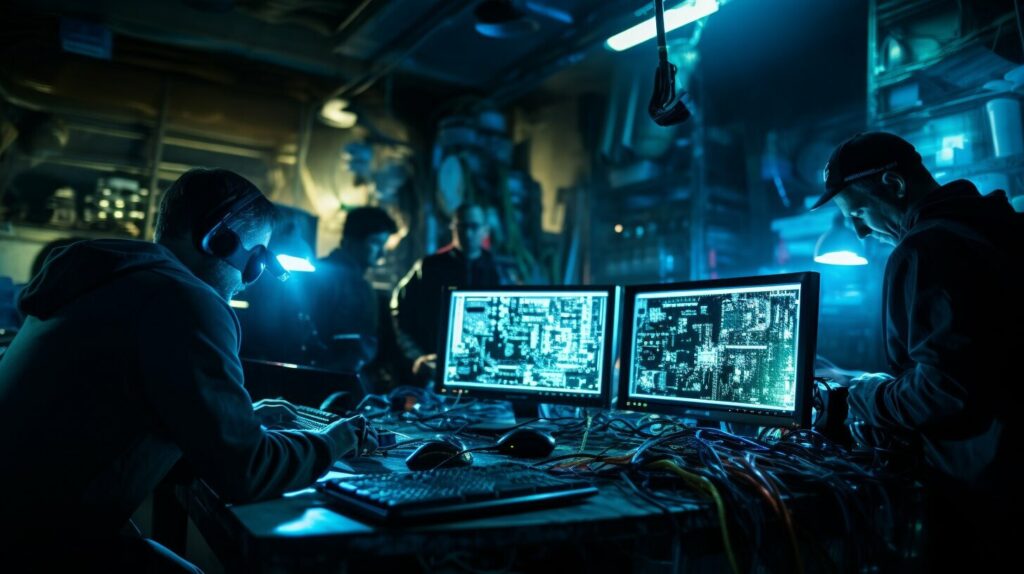In today’s digital age, the field of computer forensics has become increasingly important. With the rise of cyber attacks and the need to protect digital information, computer forensic professionals play a crucial role in investigating and preventing digital crimes. In this article, we will delve into the world of forensics, exploring its advantages and disadvantages for those considering a career in this field.
Key Takeaways
- Forensics is the practice of collecting, analyzing, and preserving electronic data to be used as evidence in legal cases.
- It plays a vital role in criminal investigations, cybersecurity, and civil litigation.
- This article will discuss the advantages and disadvantages, trends in the field, and career opportunities.

Advantage 1: High Demand for Computer Forensic Analysts
With the increasing prevalence of cyber attacks and digital crimes, the demand for computer forensics professionals has skyrocketed. Organizations of all sizes need skilled individuals who can investigate and analyze digital evidence in order to identify and mitigate cyber threats. According to the Bureau of Labor Statistics, employment of information security analysts, which includes cyber security experts, is projected to grow 31 percent from 2019 to 2029, much faster than the average for all occupations.
Advantage 2: Lucrative Career Opportunities
Due to the high demand and specialized nature of computer forensics, professionals in this field often enjoy lucrative career opportunities. With the right certifications and experience, individuals can command high salaries and secure positions in both the public and private sectors. Additionally, the field offers room for growth and advancement, allowing professionals to continually improve their skills and work on high-profile cases.
Advantage 3: Diverse Areas of Specialization
Computer forensics is a multidisciplinary field that encompasses various areas of specialization. From digital forensics investigations to network forensics and database forensics, there are several avenues for professionals to explore. This diversity allows individuals to focus on their specific area of interest and develop expertise in a particular aspect of data collection. Whether one’s passion lies in cyber security or forensic analysis, there is a specialization to suit their interests.
Advantage 4: Continuous Learning and Development
The field of computer forensics is continuously evolving as technology advances and new cyber threats emerge. This constant evolution means that professionals must always be learning and adapting to stay ahead of the game. This provides a stimulating and intellectually engaging career, where individuals are constantly challenged to update their knowledge and acquire new skills. For those who have a passion for computer science and enjoy staying at the forefront of technology, a career in cyber security can be highly fulfilling.
Advantage 5: Contribution to Justice and Security
One of the most rewarding aspects of a career in cyber security is the opportunity to contribute to justice and security. By investigating cyber crimes, forensic analysts play a vital role in ensuring that criminals are brought to justice and victims receive the support they need. The work of most forensic analysts helps protect organizations’ computer systems from future attacks and safeguards sensitive digital information. This sense of purpose and the ability to make a difference in the world is a major advantage for those considering a career in this field.

Disadvantage 1: Intense Workload and Long Hours
While the field of computer forensics offers many advantages, it also comes with its fair share of challenges. One of the main disadvantages is the intense workload and long hours that forensic analysts often face. Investigating complex cyber crimes requires meticulous attention to detail and thorough analysis of digital evidence, which can be time-consuming and mentally taxing. Forensic analysts might find themselves working long hours, especially when dealing with high-profile cases or tight deadlines.
Disadvantage 2: High Stress and Pressure
Computer forensics investigations can be highly stressful, as the outcome of a case often has significant implications for both individuals and organizations. Forensic analysts need to handle sensitive information and navigate legal complexities, all while ensuring the integrity of the evidence they gather. The pressure to deliver accurate and reliable results can be immense, leading to high levels of stress and burnout for some professionals in this field.
Disadvantage 3: Extensive Training and Certification Requirements
To become a successful computer forensic analyst, individuals need to acquire extensive training and certification. A bachelor’s degree in computer science or a related field is often the minimum requirement for entry-level positions. Additionally, professionals in this field need to obtain certifications such as the Certified Forensic Computer Examiner (CFCE) or Certified Computer Examiner (CCE) to demonstrate their expertise and credibility. The time and financial investment required to obtain these qualifications can be a disadvantage for those looking to enter the field.
Disadvantage 4: Rapidly Changing Technology
As technology continues to evolve at a rapid pace, computer forensics professionals must constantly stay updated on the latest tools and techniques. This ongoing learning process can be challenging, especially for those who are not naturally inclined towards technology. It requires continuous training and professional development to stay proficient in the use of forensics tools and technologies, which can be a disadvantage for some individuals.
Disadvantage 5: Exposure to Disturbing Content
Computer forensics investigations may involve the examination of disturbing and illicit content, such as child pornography or graphic crime scenes. This exposure can have a profound emotional impact on forensic analysts, leading to a risk of psychological distress and occupational burnout. The nature of the work necessitates a strong sense of empathy and emotional resilience to mitigate these effects.
In conclusion, computer forensics offers many advantages for those interested in a career in this field. The high demand, lucrative career opportunities, diverse areas of specialization, continuous learning, and ability to contribute to justice and security are all significant advantages. However, the field also comes with its fair share of disadvantages, including an intense workload, high stress and pressure, extensive training and certification requirements, rapidly changing technology, and exposure to disturbing content. It is crucial for individuals considering a career in computer forensics to carefully weigh these pros and cons before making a decision.

Emerging Trends in Digital Forensics
The field of forensics must adapt and advance as cyber threats continue to evolve. An important trend in this field is the increasing significance of cyber security investigations. Digital evidence now plays a crucial role in many criminal investigations due to the prevalence of digital devices and online activity. Therefore, staying updated on the latest tools and techniques for analyzing digital evidence is essential for security analysts and other computer forensic professionals. This includes expertise in malware forensics, memory forensics, and other specialized areas of digital investigation.
Another emerging trend in computer forensics is the growing demand for professionals with interdisciplinary skills. Data collection science intersects with information technology, law enforcement, and legal fields, so collaboration between these areas is crucial for successful investigations. Those who are interested in pursuing a career in this field will find abundant opportunities.
According to the Bureau of Labor Statistics, the demand for digital forensic analysts is expected to grow much faster than the average for all occupations. By obtaining the proper education and training, as well as certifications from organizations like the International Society of Forensic Computer Examiners and the Society of Forensic Computer Examiners, individuals can pursue rewarding careers.
As the world becomes more digitally connected, the types of computer crimes continue to increase. The need for computer forensic investigations grows alongside these crimes, making this field more important than ever before. Staying updated on emerging trends and advancements in this field can give professionals a competitive edge and enhance their effectiveness in investigations.
The Importance of Collaboration
As a professional in the field of forensics, I am well aware of the importance of collaboration. The interdisciplinary nature of computer science necessitates the combined expertise of IT professionals, law enforcement agencies, and legal professionals in order to effectively address complex cases of computer crimes and safeguard digital information.
A vital component of a successful digital forensics career is network forensics. This involves the examination of network traffic and logs to detect potential security breaches and gather evidence for forensic investigations. To perform network forensics efficiently, it is crucial to possess a thorough understanding of an organization’s computer network and architecture. In our current digital era, computer crimes such as malware and memory forensics are becoming increasingly sophisticated.
Therefore, it is imperative for experts with diverse skill sets to collaborate in order to remain up-to-date with the latest forensic tools and techniques, ensuring the successful resolution of forensic investigations. Professional organizations offer valuable resources and networking opportunities that enable analysts and other professionals to advance their careers and stay well-informed about emerging trends in the field.

Conclusion
Digital forensics is an essential component of our modern digital age, serving a vital role in the investigation and resolution of cybercrimes, safeguarding computer systems, and providing valuable evidence for legal cases. Like any field, digital forensics has its advantages and disadvantages. However, the positive news is that there is an increasing demand for professionals in this area, offering ample opportunities for career development.
To excel in digital forensics, a strong foundation in computer science is crucial, along with critical thinking skills, attention to detail, and the ability to analyze and interpret complex data. Professional certifications such as the Certified Computer Examiner (CCE) can enhance credibility and expertise in the field. Additionally, there are resources available such as professional organizations like the International Society of Forensic Computer Examiners and the Society of Forensic Computer Examiners.
Staying up-to-date with the latest tools and techniques is vital in any field, including digital forensics. Emerging trends in this area include digital forensics investigations, network forensics, malware forensics, and memory forensics. Successful digital forensic investigations require collaboration with interdisciplinary teams, including IT professionals, law enforcement agencies, and legal professionals.
In conclusion, digital forensics presents both challenges and rewards, providing opportunities for career growth and advancement. By staying current with the latest tools and techniques and collaborating with diverse teams, we can continue to combat computer crimes and safeguard digital information.
FAQ’s
Q: What is computer forensics?
A: It is a branch of digital forensics that involves the investigation and analysis of computer systems, networks, and digital devices to gather and preserve evidence for legal purposes.
Q: What are the advantages of a career in this field?
A: There are several advantages of this career pursuit. Some of them include:
- High demand: With the increase in cybercrime and digital evidence, there is a growing demand for cyber security professionals.
- Lucrative salaries: Due to the specialized skills required, digital forensics professionals often command higher salaries.
- Variety of job opportunities: Cyber forensic professionals can work in law enforcement agencies, government organizations, private companies, or even as independent consultants.
- Continuous learning: The field of cyber security is constantly evolving, offering opportunities for continuous learning and professional growth.
- Contribution to justice: By uncovering digital evidence and assisting in solving cybercrimes, cyber forensic specialists contribute to the administration of justice.
Q: What are the career disadvantages in this field?
A: While a career in cyber forensic analysis can be rewarding, it also has some disadvantages. These include:
- High stress levels: Dealing with cybercrimes and sensitive data can be mentally and emotionally challenging.
- Long working hours: Investigations often require working long hours, especially when dealing with critical cases.
- Continuous learning: The field evolves rapidly, requiring professionals to constantly update their skills and stay updated with the latest technologies and techniques.
- Legal complexities: Analysts need to have a strong understanding of legal procedures and regulations to ensure the admissibility of their findings in court.
- Work-life balance: Due to the nature of the job, maintaining a healthy work-life balance can be challenging.
Q: What are the types of computer forensics?
A: Digital forensics can be categorized into various types, including:
- Network forensics: Involves the examination of network traffic and system logs to identify and analyze potential security breaches.
- Mobile device forensics: Focuses on extracting and analyzing data from mobile devices, such as smartphones and tablets.
- Memory forensics: Involves the analysis of computer memory to gather evidence of running processes, malware, and other volatile data.
- Malware forensics: Examines and analyzes malicious software to determine its origin, behavior, and impact.
- Digital forensics: Encompasses the investigation of any digital device or storage media for the purpose of gathering evidence.
Q: How can I pursue a career in computer forensics?
A: To pursue a career in cyber forensics, you can consider the following steps:
- Educational qualifications: Obtain a degree in computer science, digital forensics, or a related field.
- Gain relevant certifications: Acquire certifications such as Certified Forensic Computer Examiner (CFCE) or Certified Computer Forensic Examiner (CCFE).
- Gain practical experience: Internships, volunteering, or working on real cases can provide hands-on experience in computer forensics.
- Stay updated: Keep up with the latest trends, technologies, and methodologies in cyber forensics through continuous learning and professional development.
- Networking: Build professional connections and join industry organizations to expand your network and stay updated on job opportunities.
Q: What does a digital forensics investigator do?
A: The investigator is responsible for collecting, analyzing, and preserving digital evidence to support investigations related to cybercrimes. They use specialized tools and techniques to extract data from computers, networks, and other digital devices, and present their findings in a legally admissible format.
Q: What is the right educational background for a career in computer forensics?
A: While there is no specific educational background required for this career, a degree in computer science, digital forensics, or a related field is highly beneficial. Additionally, obtaining relevant certifications and gaining practical experience in the field can further enhance your prospects in cyber forensics.
Q: What are the career prospects in digital forensics?
A: It offers a wide range of career prospects. Some of the potential job roles include:
- Forensic analyst/investigator
- Incident responder
- Forensic consultant
- Forensic auditor
- Law enforcement investigator
These roles can be found in law enforcement agencies, government organizations, private cybersecurity firms, and consulting companies.
Q: What are the common types of computer crimes investigated through computer forensics?
A: Cyber forensics is used to investigate various types of computer crimes, including:
- Identity theft
- Hacking and unauthorized access
- Data breaches
- Online fraud
- Child exploitation
- Copyright infringement
It plays a vital role in gathering digital evidence and holding cybercriminals accountable for their actions.
Q: What organizations or associations are related to computer forensics?
A: There are several organizations and associations related to digital forensics, including:
- International Society of Forensic Computer Examiners (ISFCE)
- International Association of Computer Investigative Specialists (IACIS)
- International Association of Forensic Computer Examiners (IAFCE)
- Digital Forensics Certification Board (DFCB)
- Association of Digital Forensics, Security, and Law (ADFSL)
These organizations provide resources, certifications, and networking opportunities for professionals in the field of cyber forensics.




Each point could be more precise instead of repeating information. Otherwise very helpful article!